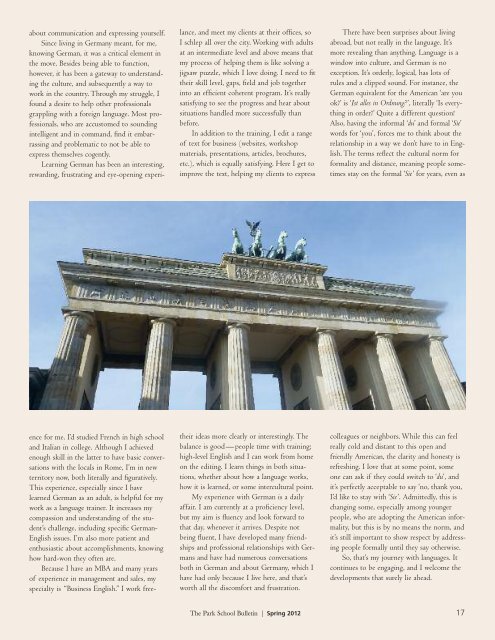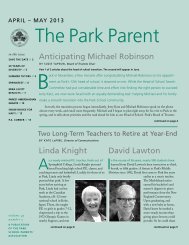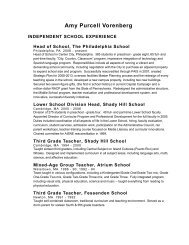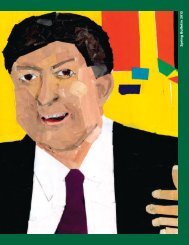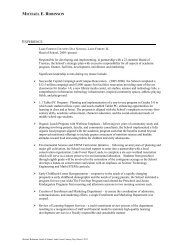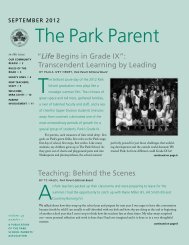Spring Bulletin 2012 - The Park School
Spring Bulletin 2012 - The Park School
Spring Bulletin 2012 - The Park School
You also want an ePaper? Increase the reach of your titles
YUMPU automatically turns print PDFs into web optimized ePapers that Google loves.
about communication and expressing yourself.<br />
Since living in Germany meant, for me,<br />
knowing German, it was a critical element in<br />
the move. Besides being able to function,<br />
however, it has been a gateway to understanding<br />
the culture, and subsequently a way to<br />
work in the country. Through my struggle, I<br />
found a desire to help other professionals<br />
grappling with a foreign language. Most professionals,<br />
who are accustomed to sounding<br />
intelligent and in command, find it embarrassing<br />
and problematic to not be able to<br />
express themselves cogently.<br />
Learning German has been an interesting,<br />
rewarding, frustrating and eye-opening experi-<br />
ence for me. I’d studied French in high school<br />
and Italian in college. Although I achieved<br />
enough skill in the latter to have basic conversations<br />
with the locals in Rome, I’m in new<br />
territory now, both literally and figuratively.<br />
This experience, especially since I have<br />
learned German as an adult, is helpful for my<br />
work as a language trainer. It increases my<br />
compassion and understanding of the student’s<br />
challenge, including specific German-<br />
English issues. I’m also more patient and<br />
enthusiastic about accomplishments, knowing<br />
how hard-won they often are.<br />
Because I have an MBA and many years<br />
of experience in management and sales, my<br />
specialty is “Business English.” I work free-<br />
lance, and meet my clients at their offices, so<br />
I schlep all over the city. Working with adults<br />
at an intermediate level and above means that<br />
my process of helping them is like solving a<br />
jigsaw puzzle, which I love doing. I need to fit<br />
their skill level, gaps, field and job together<br />
into an efficient coherent program. It’s really<br />
satisfying to see the progress and hear about<br />
situations handled more successfully than<br />
before.<br />
In addition to the training, I edit a range<br />
of text for business (websites, workshop<br />
materials, presentations, articles, brochures,<br />
etc.), which is equally satisfying. Here I get to<br />
improve the text, helping my clients to express<br />
their ideas more clearly or interestingly. <strong>The</strong><br />
balance is good—people time with training;<br />
high-level English and I can work from home<br />
on the editing. I learn things in both situations,<br />
whether about how a language works,<br />
how it is learned, or some intercultural point.<br />
My experience with German is a daily<br />
affair. I am currently at a proficiency level,<br />
but my aim is fluency and look forward to<br />
that day, whenever it arrives. Despite not<br />
being fluent, I have developed many friendships<br />
and professional relationships with Germans<br />
and have had numerous conversations<br />
both in German and about Germany, which I<br />
have had only because I live here, and that’s<br />
worth all the discomfort and frustration.<br />
<strong>The</strong>re have been surprises about living<br />
abroad, but not really in the language. It’s<br />
more revealing than anything. Language is a<br />
window into culture, and German is no<br />
exception. It’s orderly, logical, has lots of<br />
rules and a clipped sound. For instance, the<br />
German equivalent for the American ‘are you<br />
ok?’ is ‘Ist alles in Ordnung?’, literally ‘Is everything<br />
in order?’ Quite a different question!<br />
Also, having the informal ‘du’ and formal ‘Sie’<br />
words for ‘you’, forces me to think about the<br />
relationship in a way we don’t have to in English.<br />
<strong>The</strong> terms reflect the cultural norm for<br />
formality and distance, meaning people sometimes<br />
stay on the formal ‘Sie’ for years, even as<br />
colleagues or neighbors. While this can feel<br />
really cold and distant to this open and<br />
friendly American, the clarity and honesty is<br />
refreshing. I love that at some point, some<br />
one can ask if they could switch to ‘du’, and<br />
it’s perfectly acceptable to say ‘no, thank you,<br />
I’d like to stay with ‘Sie’. Admittedly, this is<br />
changing some, especially among younger<br />
people, who are adopting the American informality,<br />
but this is by no means the norm, and<br />
it’s still important to show respect by addressing<br />
people formally until they say otherwise.<br />
So, that’s my journey with languages. It<br />
continues to be engaging, and I welcome the<br />
developments that surely lie ahead.<br />
<strong>The</strong> <strong>Park</strong> <strong>School</strong> <strong>Bulletin</strong> | <strong>Spring</strong> <strong>2012</strong> 17


